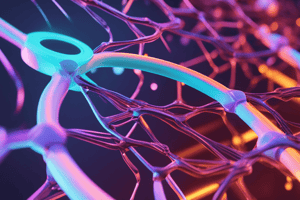Podcast
Questions and Answers
Who created the first electric generator in 1663?
Who created the first electric generator in 1663?
- Charles-Augustin de Coulomb
- Luigi Galvani
- Alessandro Volta
- Otto von Guericke (correct)
According to Charles François de Cisternay du Fay, what did electricity consist of?
According to Charles François de Cisternay du Fay, what did electricity consist of?
- Two kinds of energy: kinetic energy and potential energy
- Two types of magnets: strong magnets and weak magnets
- Two fluids: 'vitreous' or positive electricity, and 'resinous' or negative electricity (correct)
- Two types of light: natural light and artificial light
What did Luigi Galvani conclude in his essay 'De Viribus Electricitatis in Motu Musculari Commentarius'?
What did Luigi Galvani conclude in his essay 'De Viribus Electricitatis in Motu Musculari Commentarius'?
- The electric eel and torpedo ray did not produce electricity
- Static electricity was the only form of electricity in nature
- Metal probes could not activate nerves and muscles in animal tissue
- Animal tissue contained an innate, vital force called 'animal electricity' (correct)
What did Alessandro Volta develop as a result of his experimentation?
What did Alessandro Volta develop as a result of his experimentation?
What led Charles-Augustin de Coulomb to develop the law of electrostatic attraction?
What led Charles-Augustin de Coulomb to develop the law of electrostatic attraction?
What distinguishes an electrochemical reaction from a conventional chemical reaction?
What distinguishes an electrochemical reaction from a conventional chemical reaction?
What is the branch of physical chemistry concerned with the relationship between electrical potential difference and identifiable chemical change?
What is the branch of physical chemistry concerned with the relationship between electrical potential difference and identifiable chemical change?
In electrochemical reactions, what are the electrodes separated by?
In electrochemical reactions, what are the electrodes separated by?
Who is known as the 'Father of Magnetism' for his work on magnets in the 16th century?
Who is known as the 'Father of Magnetism' for his work on magnets in the 16th century?
When a chemical reaction is driven by an electrical potential difference, what is it called?
When a chemical reaction is driven by an electrical potential difference, what is it called?
Which factor greatly influences the rate of transformation of reactant molecules into products?
Which factor greatly influences the rate of transformation of reactant molecules into products?
In which type of reaction are acid/base reactions, the formation of salts, and ion exchange usually fast?
In which type of reaction are acid/base reactions, the formation of salts, and ion exchange usually fast?
What limits the reaction to the interface between the reactants when they are in separate phases?
What limits the reaction to the interface between the reactants when they are in separate phases?
In which phase do reactions tend to occur only at the surface of the liquid when reacting with a gas?
In which phase do reactions tend to occur only at the surface of the liquid when reacting with a gas?
What can simplify the rate law in consecutive first order reactions?
What can simplify the rate law in consecutive first order reactions?
What is the main focus of chemical kinetics?
What is the main focus of chemical kinetics?
Who is recognized for the pioneering work in chemical kinetics?
Who is recognized for the pioneering work in chemical kinetics?
What did Peter Waage and Cato Guldberg establish in 1864?
What did Peter Waage and Cato Guldberg establish in 1864?
What distinguishes chemical kinetics from chemical thermodynamics?
What distinguishes chemical kinetics from chemical thermodynamics?
Which chemist studied chemical dynamics and published 'Études de dynamique chimique' in 1884?
Which chemist studied chemical dynamics and published 'Études de dynamique chimique' in 1884?
Flashcards are hidden until you start studying




